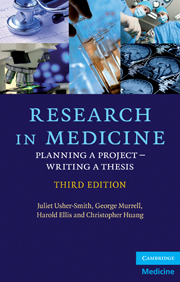Book contents
- Frontmatter
- Contents
- Preface
- 1 Introduction
- 2 Deciding whether to do research
- 3 Deciding when to do research
- 4 Selecting a research degree
- 5 Choosing a department, research supervisor and project
- 6 Applying for research positions and funding
- 7 Getting started
- 8 Overcoming frustration
- 9 Writing scientifically
- 10 Publishing a paper
- 11 Attending scientific meetings
- 12 Writing a thesis
- 13 Submitting a thesis and preparing for the viva voce examination
- Further reading
- Appendix: Information for research students wishing to study overseas
- Index
5 - Choosing a department, research supervisor and project
Published online by Cambridge University Press: 05 May 2010
- Frontmatter
- Contents
- Preface
- 1 Introduction
- 2 Deciding whether to do research
- 3 Deciding when to do research
- 4 Selecting a research degree
- 5 Choosing a department, research supervisor and project
- 6 Applying for research positions and funding
- 7 Getting started
- 8 Overcoming frustration
- 9 Writing scientifically
- 10 Publishing a paper
- 11 Attending scientific meetings
- 12 Writing a thesis
- 13 Submitting a thesis and preparing for the viva voce examination
- Further reading
- Appendix: Information for research students wishing to study overseas
- Index
Summary
After deciding on the timing for your research programme and the degree to which you wish to aspire, you next need to decide where you would like to conduct your research, whom you would like to work with and what you are going to work on. The order in which you decide these and their relative importance will vary significantly between individuals and specific circumstances. It might be that before you actually start applying for research positions, you have strong ideas about the area of research you might pursue, and the person with whom you may wish to work. If that is the case, it will determine the channels along which you will make enquiries and applications. Alternatively you may seek openings or scholarships at particular departments with initially less specific interests in mind, and seek a direction for your research afterwards. Most applicants will discover a middle course, being initially drawn towards a broad area of research and a department, then gradually acquiring knowledge of available research projects and personnel as enquiries and the application proceed. In this latter case, a good place to start is a university or clinical department whose work or interest lies close to interests in your desired career path. For instance, if you would like ultimately to be a transplant surgeon, you might try the local university department of surgery. If your career plans have not yet crystallized, the decision is inevitably more difficult.
- Type
- Chapter
- Information
- Research in MedicinePlanning a Project – Writing a Thesis, pp. 25 - 40Publisher: Cambridge University PressPrint publication year: 2010



